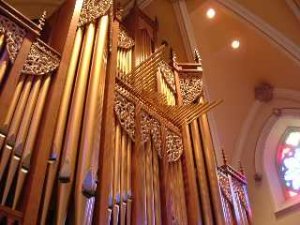

|
|
| Musical Musings: CNP Feedback |
CNP Feedback - Organ Music for VespersThe "Feedback Box" on the CanticaNOVA Publications website has proven quite effective in promoting communications on a variety of subjects, and expressing concerns of liturgists and musicians. From time to time, we'll compile a few of these questions or comments and anonymously put them in public view, with the hope that others with similar concerns may benefit from their content.
Q. Dear CNP:
A. Dear Eve: Thank you for your kind words about the CanticaNOVA Publications website. I'm not completely sure what you mean by "Vesper Service" — in a Protestant setting it can mean any service held in the evening. In the Roman Catholic Church, Vespers is the older name for Evening Prayer. 
If we look at the Catholic "Vesper Service" (or Evening Prayer), there is relatively little organ music required. The service, even if it's planned with a lot of music, is mostly psalms and canticles (read or sung), which may or may not be accompanied. There is a hymn at the beginning, which can use organ. The only places where solo organ music is a possibility would be the Prelude, a Processional and a Recessional. There is no particular organ literature that is "suited" to Vespers in particular. During the seasons of the Church year (Advent, Christmastide, Lent, Eastertide) the hymn and all organ music should have a seasonal flavor. Likewise for solemnities and feasts, like All Saints, Immaculate Conception, Annunciation, Transfiguration, Holy Cross. Suggestions for any of this organ music would be gleaned from seasonal or feast ideas [see Liturgical Planning Pages]. During the rest of the year, almost any organ music can work. French and Italian composers have written music based on the Gregorian chant Vesper hymns. Organiste liturgique by Alexandre Guilmant has examples of these. French composers from the Baroque (Nicolas Lebegue) to the Romantic (César Franck) have written versets for the Magnificat. Among the British school, Edward Elgar has a set of Vesper Voluntaries, playable on small organs, that can be useful as prelude or processional music. Preludes during Ordinary Time shouldn't be too loud (save the fireworks for Christmastide, Eastertide, solemnities and feasts). The Processional should be stately, and just long enough to get the priest (or deacon or bishop) to the sanctuary. This is not an Entrance Hymn (which shouldn't be cut off arbitrarily when the procession reaches the altar) — this is true walking music. The Recessional follows the Dismissal, and can certainly be louder and livelier than the Prelude.
Gary Penkala
See also
|